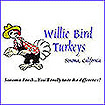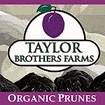By Ellen Walsh
The
Lundberg Family Farm insures the quality of their rice
by insuring
the quality of their seed. Specializing in high quality,
specialty rice grains grown
from seeds that have been produced in their own seed
lab, the Lundbergs are
insuring that these particular species of grains will
be available for generations
to come. "Many of the varieties that we grow are
not produced elsewhere by
the California rice industry." explains Bryce Lundberg.
"We propagate our own seed." However, these
seeds are not propagated solely
for varietal survival. They are propagated for Purity.
Food&Beverage
International Magazine visited
with three great chefs to see how they would work with
Lundberg Family Farms rice grains.
We chose high end specialty grains so that we could
get some insight as to how best to utilize the different
varieties.
Although
their Organic California Basmati is available
in both white and brown, our chefs chose to experiment
with the white Basmati. The long grain aromatic rice
with the fragrance of Indian Basmati was easy to work
with, and served as Executive
Chef Gary Roth's choice to enhance
its flavor with exotic juice and stock blends in the
cooking process. Gary repeated this creative process
again, when he enhanced the Lundberg Family Farm Wild
Rice Blend with a wild morel jus sauce, created to be
paired with a seared veal filet.
At
the other end of the spectrum, we have the heartier
flavors of the Black Japonica rice, and the Wehani rice
grain. We visited with Executive
Chef Josh Silvers of Syrah,
who specializes in an upscale version of comfort food.
Black Japonica is a field blend of short grain black
rice and medium grain mahogany rice that provides an
interesting taste appeal with its nutty mushroom-like,
musky flavor. Josh chose to pair this rice with an intensely
flavored asian barbecued chicken dish, leaving the natural
aromas and flavors of the black japonica simple and
unadorned, ready to blend with the main course in its
natural state. However, when he approached the milder
tasting Wehani grain, he produced an elegant salad,
utilizing the full spectrum of contrasting flavors found
through marinades, liquors, dried fruits, and sautéed
nuts.
In
conclusion, we present the dramatic interpretation of
Gary
Chu's Sushi art, which can only
be accomplished with the most reliable of sticky, or
Sushi rice. This wonderful organic rice grown by Lundberg
Family Farms, should be in the pantry of every Japanese
restaurant, grocery store, or deli that prepares sushi.
Gary is the executive chef and owner of Gary
Chu's Restaurant, and Osake,
located in the beautiful wine country of Santa Rosa,
California. Gary creates dramatic pieces with sushi,
while entertaining guests behind his sushi bar every
night of the week. Gary's motto is simplicity. We think
you will pick up some interesting tips in how to handle
rice properly for the optimal performance of your sushi
art.




















